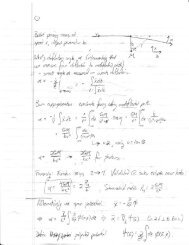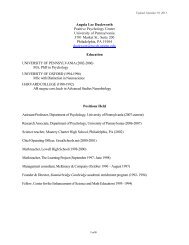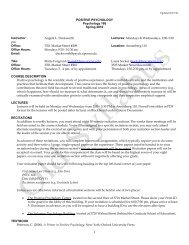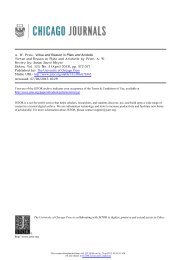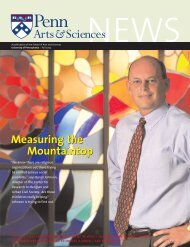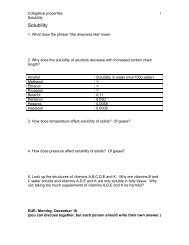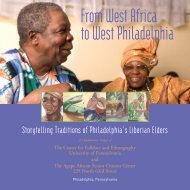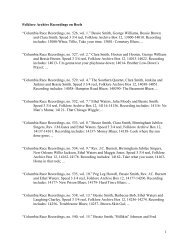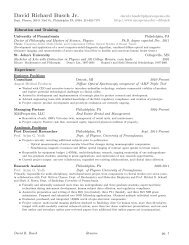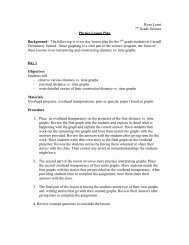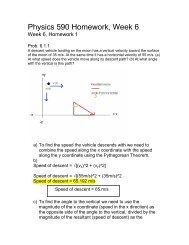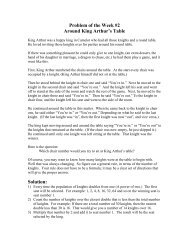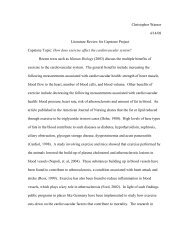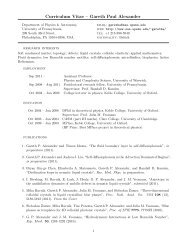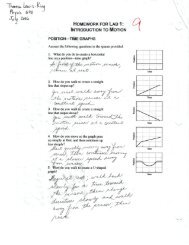PENN SUMMER - University of Pennsylvania
PENN SUMMER - University of Pennsylvania
PENN SUMMER - University of Pennsylvania
You also want an ePaper? Increase the reach of your titles
YUMPU automatically turns print PDFs into web optimized ePapers that Google loves.
successes <strong>of</strong> the Roman state. We will look at this process from its<br />
inception and trace the formation <strong>of</strong> Rome’s Mediterranean empire<br />
over the last three centuries BC; we shall then consider the social,<br />
economic and political consequences <strong>of</strong> this great achievement, especially<br />
the great political transition from the Republic (rule by the<br />
Senate) to the Principate (rule by emperors). We shall also consider<br />
limitations to Roman power and various types <strong>of</strong> challenges, military,<br />
cultural, and religious, to the hegemony <strong>of</strong> the Roman state. Finally,<br />
we shall try to understand the process <strong>of</strong> the development <strong>of</strong> a distinctive<br />
Roman culture from the emergence new forms <strong>of</strong> literature,<br />
like satire, to the gladiatorial arena as typical elements that contributed<br />
to a Roman social order.<br />
anThroPoloGY<br />
anTh 001 910 MW 5:30pm–8:40pm schweitzer<br />
Introduction to Archaeology<br />
Fulfills History & Tradition Sector<br />
An introduction to the history, concepts, and methods <strong>of</strong> the anthropological<br />
study <strong>of</strong> ancient peoples using archaeological illustrations<br />
to indicate the relationships <strong>of</strong> archaeological interpretations with<br />
cultural and physical anthropology.<br />
anTh 002 910 MW 6:00pm–9:10pm hammarberg<br />
Introduction to Cultural Anthropology<br />
Fulfills Society Sector<br />
An introduction to the study <strong>of</strong> culture and human institutions, how<br />
they change, and their role in both literate and nonliterate societies.<br />
anTh 003 910 Tr 6:00pm–9:10pm renschler<br />
Introduction to Human Evolution<br />
Fulfills Living World Sector<br />
How did humans evolve? When did humans start to walk on two legs?<br />
How are humans related to non-human primates? This course focuses<br />
on the scientific study <strong>of</strong> human evolution describing the emergence,<br />
development, and diversification <strong>of</strong> our species, Homo sapiens. First<br />
we cover the fundamental principles <strong>of</strong> evolutionary theory and some<br />
<strong>of</strong> the basics <strong>of</strong> genetics and heredity as they relate to human morphological,<br />
physiological, and genetic variation. We then examine<br />
what studies <strong>of</strong> nonhuman primates (monkeys and apes) can reveal<br />
about our own evolutionary past, reviewing the behavioral and ecological<br />
diversity seen among living primates. We conclude the course<br />
examining the “hard” evidence <strong>of</strong> human evolution—the fossil and<br />
material culture record <strong>of</strong> human history from our earliest primate<br />
ancestors to the emergence <strong>of</strong> modern Homo sapiens. You will also<br />
have the opportunity, during recitations, to conduct hands-on exercises<br />
collecting and analyzing behavioral, morphological, and genetic<br />
data on both humans and nonhuman primates and working with the<br />
Department <strong>of</strong> Anthropology’s extensive collection <strong>of</strong> fossil casts.<br />
anTh 102 910 MW 10:00am–1:10pm hammarberg<br />
American Civilization in the 20th Century<br />
Fulfills History & Tradition Sector / Crosslisted with: ANTH 692 910<br />
This course covers the changing society and culture <strong>of</strong> the United<br />
States during the 20th century. It begins with American regionalism<br />
in 1900 and traces the rise <strong>of</strong> mass culture and economic depression<br />
in the period from WWI through WWII, followed by the changing<br />
conflicts <strong>of</strong> idealism, realism, and popular culture to the end <strong>of</strong> the<br />
Cold War, the rise <strong>of</strong> the Internet, and the new problems posed by<br />
21st-century globalism. The course will emphasize the discussion<br />
and analysis <strong>of</strong> primary source materials, employing material culture,<br />
texts, and film as forms <strong>of</strong> evidence. The concept <strong>of</strong> culture enables<br />
us to treat the changing cultural context as the “natural” environment<br />
<strong>of</strong> Americans during the 20th century.<br />
anTh 184 910 Tr 6:00pm–9:00pm Chrzan<br />
Medical Anthropology <strong>of</strong> Alcohol Use<br />
Crosslisted with: HSOC 154 910<br />
The morality, rights, and responsibilities <strong>of</strong> alcohol use are hotly debated<br />
in the United States. The rhetoric <strong>of</strong> appropriate use ranges from<br />
Puritan-inspired abstinence campaigns, through health-promoting<br />
moderation arguments, to discourses legitimizing hedonism. The result<br />
<strong>of</strong> a lack <strong>of</strong> clear cultural paradigms for intoxicant use is clearly seen on<br />
college campuses, where movements for zero-tolerance alcohol bans<br />
coexist with social rituals that include binge drinking. This course will<br />
utilize medical anthropology theory to: 1) contextualize the phenomenon<br />
historically and cross-culturally; 2) encourage students to critically<br />
analyze existing paradigms which determine acceptable usage and<br />
treatment modalities; 3) use the <strong>University</strong> <strong>of</strong> <strong>Pennsylvania</strong> campus as<br />
a local case study/field site to investigate alcohol use. Students will<br />
move from theory to action through creation <strong>of</strong> a feasible proposal addressing<br />
alcohol-use education on Penn’s campus, or will participate in<br />
the modification and implementation <strong>of</strong> existing proposals to promote<br />
rational and low-risk use <strong>of</strong> alcohol in the college community.<br />
arT hiSTorY<br />
arTh 101 910 TBa staff<br />
European Art and Civilization Before 1400<br />
Fulfills Arts & Letters Sector<br />
This is a double introduction: to looking at the visual arts; and, to the<br />
ancient and medieval cities and empires <strong>of</strong> three continents—ancient<br />
Egypt, the Middle East and Iran, the Minoan and Mycenaean Bronze<br />
Age, the Greek and Roman Mediterranean, and the early Islamic,<br />
early Byzantine and western Medieval world. Using images, contemporary<br />
texts, and art in our city, we examine the changing forms <strong>of</strong><br />
art, architecture and landscape architecture, and the roles <strong>of</strong> visual<br />
culture for political, social, and religious activity.<br />
arTh 209 910 Tr 9:00am–12:00pm Toure<br />
African Art<br />
Fulfills Cross-Cultural Analysis Course / Crosslisted with: AFRC 209 910,<br />
AFST 209 910<br />
This intensive 6-week course will introduce sub-Saharan African<br />
cinema(s) in their diversity, their originality, and their importance on<br />
and outside <strong>of</strong> the African continent. Themes will consider historical<br />
and socio-political issues, colonial and postcolonial representations<br />
<strong>of</strong> African arts and cultures, cultural identity, orality, aesthetics,<br />
anthropology and ethnography, immigration and work challenges,<br />
gender and sexuality. Film theories and methodologies will be discussed.<br />
Class time will include film screenings, lectures, and discussions.<br />
Movies produced by Soulemane Cisse, Cheick Oumar Sissoko,<br />
Adama Drabo, Halime Gerima, Sembene Ousmane, Alain Resnais,<br />
Manthia Diawara, and Zola Mazeko among others will be featured.<br />
<strong>SUMMER</strong> SESSIOn I • MAY 24–JULY 2, 2010 15



